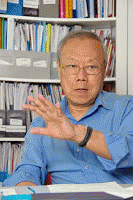
Professor (Dr) Prakit Vathesatogkit, Executive Secretary of Action on Smoking and Health Foundation of Thailand
(Image by CNS (Citizen News Service)) Details DMCA
(CNS): As lung cancer treatment outcomes are difficult and five-year survival is abysmally low, preventing lung cancer is a top public health priority. Up to 90% of lung cancer cases are because of tobacco use. Therefore effective implementation of evidence-based and comprehensive tobacco control policies will make a huge difference in slashing new cases of lung cancer as well as preventing a large number of other diseases, disabilities and premature deaths attributed to tobacco use" said Professor (Dr) Prakit Vathesatogkit, Executive Secretary of Action on Smoking and Health Foundation of Thailand.
"More than 100,000 deaths occur each year because of lung cancer in ASEAN. New cases of lung cancer and deaths too are rising each year in ASEAN. That is why tobacco control attains a never-before urgency" added Prof Prakit Vathesatogkit.
IASLC Asia Pacific Lung Cancer Conference (APLCC 2016) is being held in Chiang Mai, Thailand and CNS (Citizen News Service) is the official media partner of APLCC 2016. Prof Prakit was one of the plenary speakers at APLCC 2016.
He added: "Out of the 50,710 tobacco related deaths occurring in Thailand every year, 11,740 or 23% were because of lung cancer. In ASEAN region, it is estimated that out of the total 467,194 smoking related deaths every year, 107,454 were due to lung cancer. Tobacco-related lung cancer deaths will keep growing in catastrophic proportions with ageing 121 million smokers in ASEAN region if we fail to act now. Also it is important to underline that tobacco related lung cancer rate might shoot up because of the combined effect of tobacco industry's aggressive marketing, weak political will on tobacco control and other key factors. Therefore while making progress in treatment of lung cancer is very welcome, more contribution from healthcare workers in tobacco control is direly needed."
Prof Prakit walks the talk!
Prof Prakit Vathesatogkit himself has lived by example of how health professionals can contribute to tobacco control in their lifetime. In his 40 years as a lung disease specialist, he spent first 10 years in clinical management of lung diseases, of which smoking was the major and common cause! He was left aghast not only with late diagnosis of lung cancer but also to see abysmally low cure rates for lung cancer cases. Also available treatment was within reach to only a few of his patients. He finally decided to join the brewing tobacco control movement 30 years ago and learnt by doing. He has indeed set an example for others to imbibe. He has contributed on tobacco control related policy advocacy and then engaged with legislative processes in Thailand. His leadership in tobacco control in strengthening the global tobacco treaty (formally called the WHO Framework Convention on Tobacco Control or WHO FCTC) is well acknowledged.
Healthcare workers can bolster tobacco control
Health professionals including lung cancer experts have a prominent role to play in tobacco control. They have the trust of the population, the media and opinion leaders, and their voices are heard across a vast range of social, economic and political arenas.
(Note: You can view every article as one long page if you sign up as an Advocate Member, or higher).





